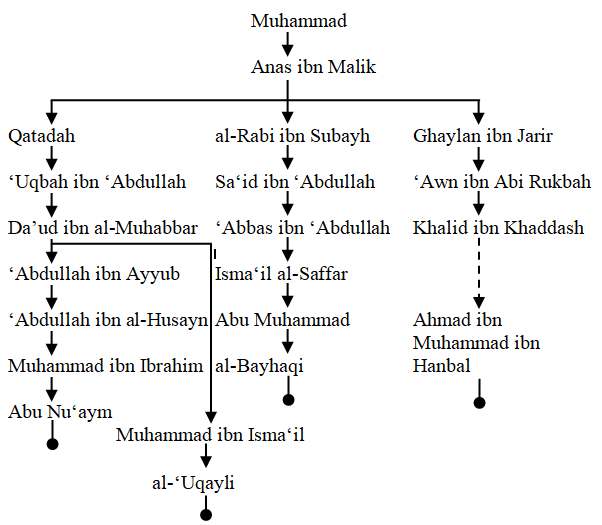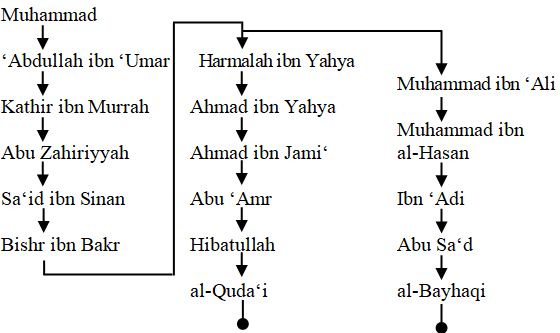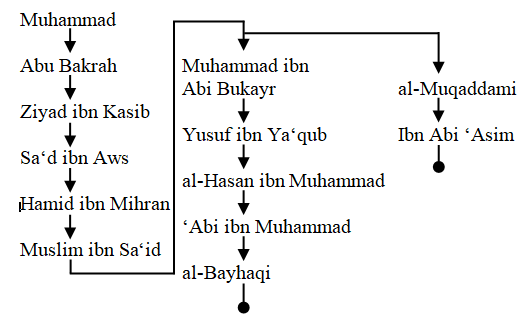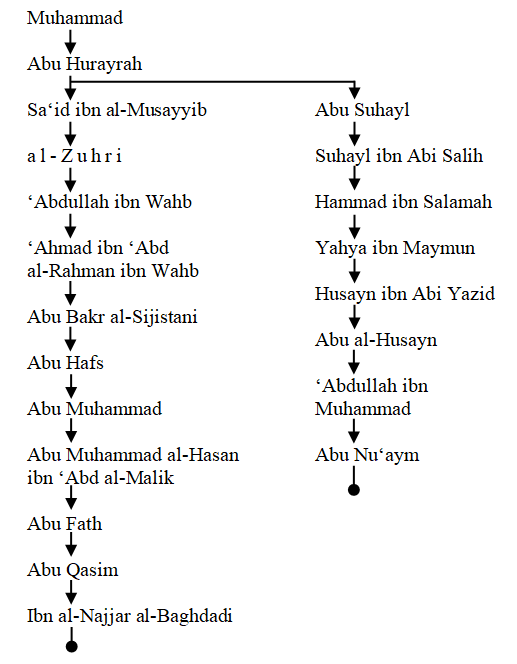|
I Introduction
Some narratives say that a Muslim ruler is
God’s shadow on Earth. In this article, the isnad of these
narratives shall be critically examined.
II Critical Analysis
1. Anas ibn Malik (rta)
أخبرنا أبو محمد السكري أنبأ إسماعيل الصفار
ثنا عباس بن عبد اللّٰه الترقفي ثنا سعيد بن عبد اللّٰه الدمشقي
ثنا الربيع بن صبيح عن أنس بن مالك عن رسول اللّٰه صلي اللّٰه
عليه وسلم قال إذا مررت ببلدة ليس فيها سلطان فلا تدخلها إنما
السلطان ظل اللّٰه في الأرض ورمحه في الأرض
Malik reports from God’s Messenger that he said: “If you pass
by a territory that does not have a ruler, do not enter it.
Indeed, a ruler is God’s shadow on earth and His spear on
earth.”
Following is the schematic illustration of the isnad of this
narrative’s variants:

The variant recorded by Abu Nu‘aym and al-‘Uqayli has a very
suspect narrator: Da’ud ibn al-Muhabbar (d. 206 AH). Following
is the jarh recorded by al-Mizzi about him: Ahmad ibn Hanbal
and al-Bukhari regard him to be nothing, someone who knows
nothing about Hadith; ‘Ali ibn al-Madini says dhaba hadithuhu;
Ibrahim ibn Ya qub al-Juzjani says that kana yarwi ‘an kullin
wa kana mudtarib al-amr; Abu Zur‘ah and al-Nasa’i regard him
to be da‘if; Abu Hatim says that he is dhahib al-hadith and
unreliable; Salih Muhammad al-Baghdadi opines that he is da‘if
sahib manakir and at another place says that he has been
refuted and regarded to be da‘if in hadith; Al-Daraqutni
regards him to be matruk al-hadith.
Ibn Hibban records: he would concoct narratives from
trustworthy narrators and narrate maqlubat from unknown ones.
Al-Azdi regards him to be matruk.
Moreover, according to al-‘Uqayli, ‘Uqbah
ibn Abdullah is majhul and narrates only from Qatadah.
Also Qatadah is famous for tadlis
and both variants have his ‘an‘anah.
The variant recorded by al-Bayhaqi is munqata‘ as no authority
says that al-Rabi‘ ibn Subayh (d. 160 AH) has heard from Anas
ibn Malik (rta) (d. 93 AH).
This is also borne out from the fact that almost 70
years separate their dates of death. Moreover, al-Rabi‘ ibn
Subayh is an extremely suspect narrator.
The variant cited in Ahmad ibn Hanbal’s ‘Ilal al-Hadith is
marred by the fact that Ahmad ibn Hanbal regards this
narrative to be munkar and says that ‘Awn ibn Abi Rukbah is
majhul.
Abu Hatim and al-Dhahabi also regard him to be majhul.
2. ‘Abdullah ibn ‘Umar (rta)
أخبرنا هبة اللّٰه بن إبراهيم بن عمر
الخولاني أبنا أبو عمرو غزوان بن القاسم المقري ثنا أحمد هو بن
جامع ثنا أحمد بن يحيي بن خالد بن حيان حدثني حرملة بن يحيي ثنا
بشر بن بكر ثنا سعيد بن سنان عن أبي الزاهرية عن كثير بن مرة عن
عبد اللّٰه بن عمر رضي اللّٰه عنه عن النبي صلي اللّٰه عليه وسلم
قال السلطان ظل اللّٰه في الأرض يأوي إليه كل مظلوم
‘Abdullah ibn ‘Umar reported from the Prophet (sws) that he
said: “A ruler is God’s shadow on earth. Every person seeks
refuge from him.”
Following is the schematic illustration of the isnad of this
narrative’s variants:

Following is the jarh recorded by al-Mizzi
on Sa‘id ibn Sinan al-Shami (d. 163 AH): Yahya ibn Ma‘in says
that he is not reliable; Ibrahim ibn Ya‘qub al-Juzjani says
that he fears that his narratives have been concocted by him;
Ahmad ibn Salih al-Misri says that he is munkar al-hadith and
that he only knows two or three of his narratives; ‘Abd al-Rahman
ibn Ibrahim Duhaym says that he is laysa bi shay’; ‘Ali ibn
al-Madini says that he does not know him; Abu Hatim regards
him to be da‘if al-hadith; Al-Bukhari regards him to be munkar
al-hadith and al-Nasa’i calls him to be matruk al-hadith.
Ibn ‘Adi says that whatever he narrates in general is not
sound and in particular if it is from al-Zahiriyyah Hadib ibn
Kurayb (as is the case here).
Ibn Hibban says that he does not like adducing from his
narratives if he is the only one narrating them.
Al-Fasawi regards him to be da‘if al-hadith.
Ibn Hajar regards him to be matruk and says that al-Daraqutni
has blamed him of fabrication.
3. Abu Bakrah (rta)
حدثنا المقدمي ثنا مسلم بن سعيد الخولاني ثنا
حميد بن مهران عن سعيد بن أوس عن زياد بن كسيب عن أبي بكرة قال
سمعت رسول اللّٰه صلي اللّٰه عليه وسلم يقول السلطان ظل اللّٰه
في الأرض فمن أكرمه أكرم اللّٰه ومن أهانه أهانه اللّٰه
Abu Bakrah said: “I heard God’s Messenger say: ‘A ruler is
God’s shadow on earth. So he who respects him, respects God
and he who disrespects him, disrespects God.’”
Following is the schematic illustration of the isnad of this
narrative’s variants:

Nothing is known about Muslim ibn Sa‘id al-Khawlani.
4. Abu Hurayrah (rta)
ثنا عبد اللّٰه بن محمد بن جعفر ثنا أبو
الحسين أحمد بن الحسن الصوفي الحافظ ثنا حسين بن أبي يزيد ثنا
يحيي بن ميمون ثنا حماد بن سلمة عن سهيل عن أبيه عن أبي هريرة
قال قال رسول اللّٰه صلي اللّٰه عليه وسلم السلطان ظل اللّٰه في
أرضه من نصحه هدي ومن غشه ضل
Abu Hurayrah stated that God’s Messenger said: “A ruler is
God’s shadow on His earth. He who is his well-wisher is guided
and he who deceives him will go astray.”
Following is the schematic illustration of the isnad of this
narrative’s variants:

Al-Mizzi records the following jarh on Ahmad ibn ‘Abd al-Rahman
ibn Wahb (d. 264 AH). About him, Abu Sa‘id
ibn Yunus says: la taqumu bi hadithihi hujjah; Ibn ‘Adi says
that Egyptian scholars of Hadith who have met him are
unanimous in regarding him to be da‘if. Ibn Abi Hatim says
that he heard Abu Zur‘ah state that he met Ahmad ibn
‘Abd al-Rahman ibn Wahb but did not narrate from him.
Ibn al-Jawzi has recorded him in his Al-Du‘afa’ and said that
initially he was sound but later he started to narrate things
which had no basis.
Ibn Shihab al-Zuhri is a mudallis and the
variant recorded by Ibn al-Najjar has his ‘an‘anah. About his
tadlis it is recorded:
وصفه الشافعي و الدار قطني و غير واحد
بالتدليس
Imam al-Shaf‘i, al-Daraqutni and others
have attributed tadlis to Ibn Shihab al-Zuhri.
Imam al-Shaf‘i says:
لا نقبل من مدلس حديثا حتی يقول فيه حدثني أو
سمعت
We will not accept any narrative of any
narrator unless he says: haddathani [he narrated to me] or
sami‘tu [I heard].
It may be noted that in the opinion of Imam
al-Shaf‘i, if a narrator has done tadlis just once in his
life, then any of his narratives that has ‘an‘anah will not be
accepted. Ibn Rajab al-Hanbali writes:
ولم يعتبر الشافعي أن يتكرر التدليس من
الراوي، ولا أن يغلب علي حديثه، بل اعتبر ثبوت تدليسه، ولو بمرة
واحدة.
Shafi‘i does not give regard to whether a
narrator continuously indulges in tadlis nor if his narratives
are dominated by tadlis. It is enough for him that if he has
indulged in tadlis just once in his life.
The following words of Abu Hatim recorded
by al-Ka‘bi show that Abu Hatim also regarded him to be guilty
of tadlis:
قال أبو حاتم الرازى: الزهرى أحب إلي من
الأعمش، وكلاهما يحتج بحديثه فيما لم يدلسا
Abu Hatim al-Razi said: “Al-Zuhri is
preferred by me over al-A‘mash and the narratives of both can
be adduced from in what both of them are not guilty of tadlis.”
Nafi‘ (d. 117 AH) records this weakness on
the part of al-Zuhri in the following words:
وكان نافع يقول: إن الزهري سمع أحاديث ابن
عمر مني فلقي سالما فقال: هذه أحاديث أبيك؟ قال: نعم، فرواها عن
سالم وتركني.
Nafi‘ used to say: “Indeed, al-Zuhri heard
from me the narratives of ‘Abdullah ibn ‘Umar. So, when he met
Salim [ibn ‘Abdullah ibn ‘Umar], he said to him: ‘Are these
narratives from your father?’ He said: ‘Yes.’ Thereafter, he
narrated them from him and stopped narrating from me.”
No information is available on Abu Muhammad al-Hasan ibn ‘Abd
al-Malik ibn Muhammad ibn Yusuf.
Regarding Abu al-Qasim ‘Ubaydullah ibn
al-Mubarak ibn al-Sayyibi, Ibn Najjar says that he would bear
false witness for a paltry price and was not secure in
narrating.
No information is available on Husayn ibn Abi Yazid.
Following are the individuals who are
identified in the current hadith corpus as Yahya
ibn Maymun:
1. Yahya ibn Maymun ibn ‘Ata ibn Zayd al-Qarshi
al-Tammar al-Basri Abu Ayyub
2. Yahya ibn Maymun al-Hadrami al-Misri Qadi
Abu ‘Amrah
3. Yahya ibn Maymun al-Dabbi al-‘Attar al-Kufi
Abu Mu‘alla
4. Yahya ibn Maymun al-Ghafiqi
5. Yahya ibn Maymun al-Ma‘na
6. Yahya ibn Maymun ibn Maysarah
7. Yahya ibn Maymun al-Hadadi
8. Yahya ibn Maymun ibn Sahl ibn ‘Ali al-Wasti
9. Yahya ibn Maymun al-‘Abdi
10. Yahya ibn Maymun al-Haddad
11. Yahya ibn Maymun al-Makhzumi
(d. 560 AH)
12. Yahya ibn Maymun al-Farisi Abu Yahya
None of the above narrates from Hammad ibn
Salamah.
The Suhayl from whom Hammad ibn Salamah
narrates is Suhayl ibn Abi Salih.
Though some authorities regard the latter to be reliable, Ibn
Abi Hatim records that according to Yahya ibn Ma‘in his
narratives are not worthy of being deduced from and that Abu
Hatim regarded him to be yuktabu hadithuhu wa yuhtajju bihi.
III Conclusion
It is evident from the above analysis that
these narratives are not reliably reported.
_______
|